#ivan pavlov
Explore tagged Tumblr posts
Text
THE WORM MAN
by Ivan Pavlov





#tentacles#fhtagn#ivan pavlov#concept art#creature#monster#horror#worm#parasite#zombie#necromorph#zbrush#dark fantasy#sci fi#fhtagnnn
226 notes
·
View notes
Text

239 notes
·
View notes
Text

Classical conditioning aka Pavlov conditioning
#psychology#science#ivan pavlov#pavlov conditioning#classical conditioning#insidesjoke#meme#memes#funny#humour#humor#comedy#dogs#animals#studying#studyblr
63 notes
·
View notes
Text



Pavlov Memes 🛎️
#psychology memes#psychology#funny meme haha#dank memes#memedaddy#lol memes#tumblr memes#meme#funny memes#best memes#memes image#memesdaily#funny post#funny shit#ha ha funny#funny stuff#funny#funny image#funny jokes#jokes#mentally fucked#pavlovs dog#ivan pavlov#behavioral psychology#behavioral science
28 notes
·
View notes
Text

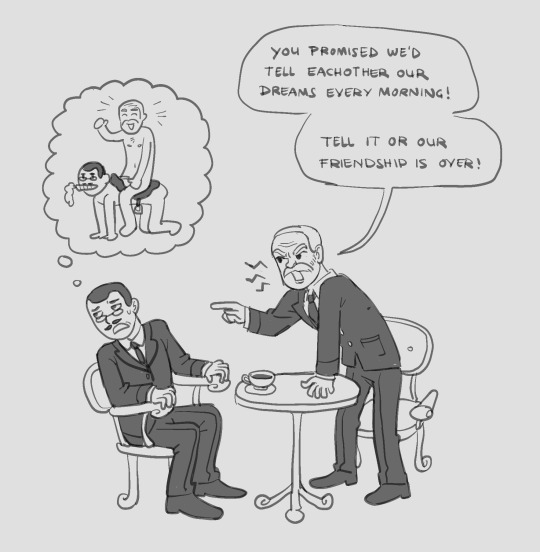
carl jung and sigmund freud had breakfast together every other morning and told eachother their dreams. one day jung kept his dream secret and freud promptly broke the friendship. i wonder what the dream was ....
#its 3 am and i realized i can draw anything i want. youre welcome#art#drawing#illustration#doodle#sketch#sigmund freud#carl jung#alfred adler#b f skinner#ivan pavlov#karen horney#my art#psychology#psychoanalysis#history
82 notes
·
View notes
Text
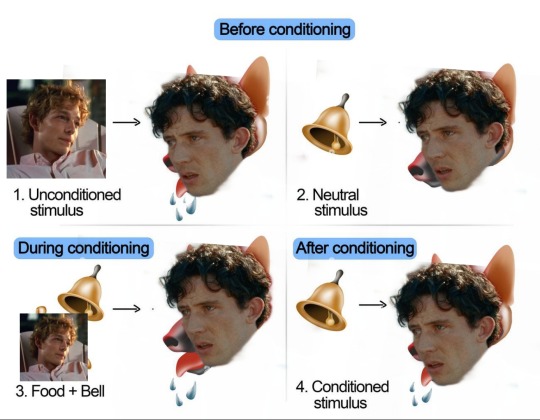
Salivating like a hungry dog but he took it too seriously.
#challengers#challengers movie#patrick zweig#josh o'connor#art donaldson#mike faist#patrick zweig x art donaldson#art donaldson x patrick zweig#artrick#Ivan Pavlov#pavlov's dog#psychology
27 notes
·
View notes
Text
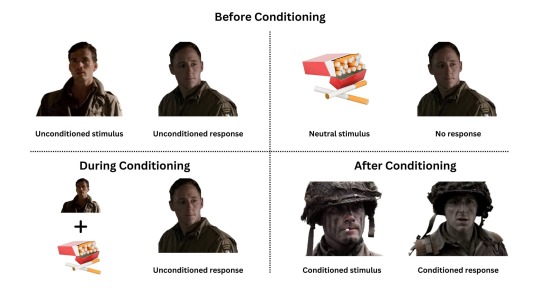
#ronald speirs#ron speirs#band of brothers#bofb#bob#hbo war#classical conditioning#pavolv's dog experiment#ivan pavlov
30 notes
·
View notes
Text
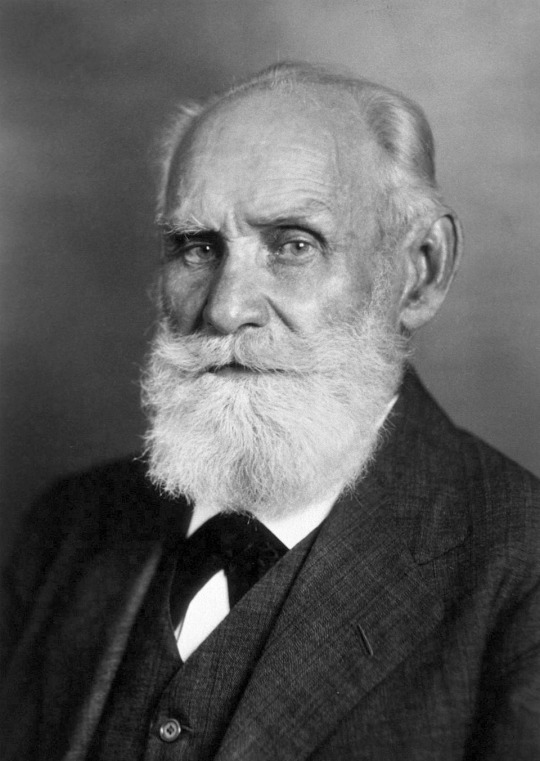
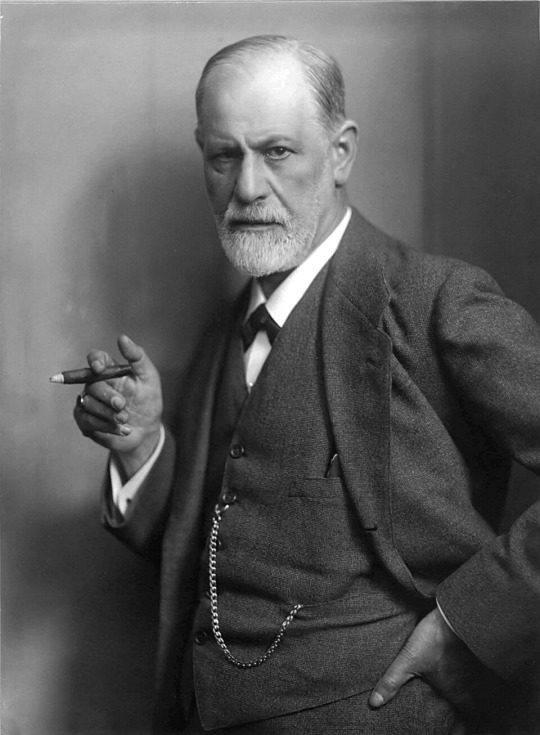
is it just me or do ivan pavlov and sigmund freud look weirdly similar??? i saw a drawing of pavlov and thought it was a drawing of freud and when i went to look both of them up these were the first photos and like…. am i really off base here?
3 notes
·
View notes
Text



Want to guess what these three thinkers have in common? Stay tuned for @spappo’s 2025 drops.
8 notes
·
View notes
Text

Think of Ivan Pavlov and drooling dogs might spring to mind.
Pavlov showed that dogs could be conditioned to salivate through a series of experiments that involved ringing a bell when dinner was served. Over time, the dogs began to associate the bell with food and then began to salivate at the when they heard the noise, even when there was no food.
His description of how canines can learn to respond in a certain way to a particular stimulus through association is known as classical conditioning. It paved the way for a new and objective method of studying animal and human behaviour, as well as treatments for phobias and other conditions.
Source: Nobel Prize
4 notes
·
View notes
Text


I am playing with my dolls and making them fight
#thesis#andrei snezhnevsky#if there's other posts in the snezhnevsky tag I'll lose my shit#ivan pavlov#shitpost#chapter 1 is going sooooo well#ussr
3 notes
·
View notes
Text

#ivan pavlov#beautiful quote#book quote#quotes#motivating quote#quote#life quote#quoteoftheday#inspiring#words#motivational
6 notes
·
View notes
Text
I know you are not
a dog
so how it is
that you are conditioned
to salivate
at the sight of my
cock
5 notes
·
View notes
Text
[Image ID: screenshot of tumblr tags that read:
#file under reasons I don't reblog activism posts with guilt trips attached
/end ID]
.
#I didn't want to come back to this #but this is actually really important and so far this is the only person that's said it #This is why it is SO important to THANK a child after they do what theu are told #especially when it was a fight #It's a way to say “I'm not mad anymore. This conflict is over now that you did what I asked. You had the ability to end this at anytime.” #Get that Christian idea of external punishment out of your head!!!#It is never your job to be hell (tags courtesy of OP)
.
More notes under the cut:
@enonem
If you shame someone about a behaviour, they will associate it with a negative emotion and thus instinctively want to stay away.
So when you try to shame someone into doing something, they will feel shame every time they start doing it, or even think about doing it, feel bad and stop at the first occasion.
If you want someone to do something, associate it with a positive emotion. So they will feel good about doing it.
So yeah, the corollary for this is indeed praising bare minimum behaviour when it marks an improvement.
.
@purplesaline
And honestly given that science has proven positive reinforcement is a far more effective tool for behaviour modification, if you want someone to stop doing a behaviour a better method than guilt or shame would be by positively reinforcing an incompatible behaviour.
In dog training it's called Differential Reinforcement of Incompatible Behaviours and it looks like this: Dog jumps up on people when excited? Positively reinforce lying down when people come visit. The dog can't jump up if they're lying down. Dog barks when they see a squirrel? Positively reinforce getting and holding a toy when they see a squirrel. (It won't necessarily completely negate the barking but it will drastically lower the volume of it. Basically making your dog gag itself lol)
In people it works the same way. Want the kids to stop playing video games inside all day? Positively reinforce going for a walk (give them some cash to go get a slushie or ice cream) or set up a water fight in the back and invite their friends over. The more you positively reinforce behaviours incompatible with staying inside playing video games the more they'll start choosing to go outside on their own instead.
The key is that whatever you use to positively reinforce them has to be more rewarding to them than the behaviour they're currently engaging in, and you don't decide what is more rewarding, they do.
.
@tacktrunkstudies-deactivated202
Four Quadrants of Classical Conditioning are positive reinforcement, positive punishment, negative reinforcement, negative punishment. These aren't related to good or bad so much as adding or subtracting a motivating stimulus. When training *new* behaviors to *start* the most effective is positive reinforcement, when trying to reduce or stop existing behaviors positive punishment is the most effective. If you want to inspire change and start someone giving a fuck, you want to use *positive reinforcement* *NOT* POSITIVE punishment. People really are as simple as dogs.
@demons-pubis
My ex, to get me to stop biting my nails, would tell me how ugly they looked, slap my hand away from my mouth, etc. I never stopped.
My current boyfriend simply told me he'd get me a manicure if I stopped. And then I did. 😭
.
@technicolor-swarm-of-bees
to add some nuance, though, guilt can be useful but shame never is.
guilt is about a specific thing you did. ('I cheated on a test and I feel guilty about it")
shame is about yourself regardless of your actions ("I'm a worthless dumb person who has to cheat to pass a test")
guilt is situational and can demotivate you from repeating an undesirable action. shame is ongoing and doesn't generally work to prevent any specific behaviours because it isn't about the behaviours—it's about your identity.
this difference is really important to understand especially in queer and disabled circles because many of us live in the shadow of a a built up mountain of shame, accumulated failures and guilt and insults and missed expectations and judgmental things people have said to us. many of us have spent our lives feeling that we simply are not as good as other people, that there's something fundamentally flawed or undesirable about us. the classic example is many people with adhd have had it pounded into them that they're lazy. when we miss a deadline, we might feel guilt over that deadline, but the overwhelming feeling is shame: I once more missed a deadline because I'm a lazy person who never completes things on time.
it's really, really important to recognise shame vs guilt so you can combat the shame and replace it with true and more realistic beliefs about yourself.
.
@cherishedproperty
The other thing that can happen is, if you shame someone enough, they start to see the bad thing as part of their identity—not something they do, but something they are. And this can also backfire horrifically.
.
@doomhamster
It says something painful about the standards of parenting/teaching in Western society that so many of us haven't been exposed to any other method of modifying behavior.
It says something fucking terrifying about the FUTURE standards of parenting/teaching that so many, even people who consider themselves progressive, are desperate to find a Good Way to be the ones doing the shaming, rather than being willing to even consider encouragement as a way of modifying others' behavior.
#social justice done badly
.
@lyndentree63
This makes so much sense of evangelicalism.
Something I wish people understood about evangelical Christians, as someone who comes from those circles, is just how unequipped people are to actually do things. There's so much focus on not doing things, people have no idea how to positively motivate themselves or others. The only behaviour-management tool they have familiarity with is demotivating. And that's heartbreaking.
People just don't know better. They don't have better tools. They're trying desperately to build things, but all they have is a sledgehammer. And that hurts everyone.
.
@doctor-fluffy
And in my experience, a person that’s only been shamed into not doing bad things…
it’s HARD to truly care about other people when you’re ruled by shame..
.
@selkies-world
Hey, look, it's my logic for how to get people to stop consuming fast fashion!!!! Neat
(You can't shame someone into doing something good, but you can shame them out of something bad & offer them an alternative for them to turn to, then praise them for making the change & pointing out how much better this new option is for them. You can also shame corporations into changing their ways when you take away their profit margin & ask how it feels to not have it anymore - and they'll change their ways in order to get the profit back, or they'll get boycotted & go out of business. BRB, I'm clicker-training people & industries.)
.
@sustainpedal
Also, shame works when it makes the person think "1) I'm doing something different from everyone else 2) I want to change my habit/lifestyle, and 3) I know how to change." If one of those three pieces is missing and you keep piling on shame, the person won't change; they'll get bogged down or bitter, withdraw from people they perceive as "better" or "normal", and develop a belief that they are incapable of change.
.
@assortedinsanities
Thought about this post yesterday and realized another limitation of the use of shame.
While swearing can be a case where guilt/shame works, it's not a universal tool to make someone stop a behavior.
If the behavior serves a needed purpose, shame will either not stop it, or make the person seek out a different behavior to substitute.
I was specifically thinking about substance abuse when this occured to me, but it can really be anything.
Maybe the kid swears in class, because it gives them a good standing with other students and that is the only way they know how to connect with others. Maybe them swearing serves to give them a tough persona so bullies think twice about going after them. Maybe they are extremely stressed about some aspect of school and this is the only outlet they have for the aggression it builds up.
Basically, while shame can stop a behavior, if you happen to shame someone for some sort of coping mechanism that will backfire. Because if you want someone to stop a problematic coping behavior, you need to motivate them to find a helpfull alternative and that will not be accomplished by shaming them.
.
@jukashi
I would add an important note: social negative reinforcement, like shaming tactics, only work if the person you're using them on actually cares about what you think of them.
If they don't care about what you think, attempts to shame them will just make them hostile, and less likely to listen to you. It's very likely to just make them double down on whatever you're trying to shame them about. Example: Me still having long hair despite being bothered about it for most of my adolescence. I don't even actually like having long hair that much! There's just a 'fuck those guys' response still baked into my brain somewhere that makes me not want to cut it, because it'd be like agreeing with them, even decades later.
Important note to the important note: Do not mistake shame not working on someone as them not caring about you. They could just think you're incorrect to shame them - which, you must remember, is always a possibility. Anyone can be wrong about something. The tumblr demographic should be familiar with the idea of being shamed about things by people they care about, and still refusing to change those things.
Important note three, revengeance: If someone does care about you, you'd better make sure you're right before you do any shaming tactics, because shaming someone who cares what you think for no good reason is something that's pretty shameworthy itself.
.
@strive-to-be-human
Do not punish behavior you wish to see!
If someone is going to make meaningful steps toward desirable behavior, you have to reward any motion in that direction. You have to help people figure out what is blocking them from doing the desirable behavior, help them find tools or strategies to get around those blocks, and then celebrate attempts to do the thing you want.
If you're thinking to yourself, "Sure, that works on toddlers, but adults should know better," come and sit by me. Would you like a cup of coffee?
I want you to think of a time at work when you made a mistake. Maybe you didn't know better. Maybe you did but you fumbled the task inadvertently. Maybe you knew better and you didn't care. Maybe you thought the established procedure is stupid so you didn't do it on purpose. It's your memory; anything can be true.
Let's imagine - whether or not this is how your specific memory plays out - that your boss pulled you aside and yelled at you for five whole minutes about how horrible (and horribly incompetent!) you are. No questions about how you arrived at the decision process you did... (except maybe the rhetorical, disingenuous, "What were you thinking?!") Just a dressing down. Perhaps even a formal writeup that goes on your employee record.
In this memory you have (or the imaginary scenario), how enthusiastic are you about finding the RIGHT way to do things? Are you feeling uplifted, capable and motivated? Or are you feeling demoralized, embarrassed and paralyzed?
Take that memory of a time when you made a workplace error and rewrite it with me. (How's your coffee? Need a warm-up?) Let's imagine, instead, that your boss pulls you aside and says something like "Hey, I noticed the last time X happened during opening, Y and Z weren't completed. Normally you're pretty great about Y and Z. What's going on?" or "Thank you so much for getting me that report on Company B. Could you also get me an addendum that includes [the thing you forgot to include in the first place]?" or "I've noticed that you're consistently doing [this task] in a [specifically wrong] way. We need it done [the correct way] for [reasons]. What can I do to help make sure [task] is [done correctly] going forward?"
Check in with your body. How does this boss conversation feel? You probably still feel threatened and embarrassed - especially if you live in the US, like me - because we are so primed to hear derision, censure and punishment every time our boss talks to us! But this new boss thinks we're great! They just need us to do a little better. They WANT us to succeed!
Even adults want kindness and compassion. Reward desirable behavior. Do not punish behaviors you wish to see.
If you do 9 things out of 10 correctly and your boss shouts at you over one (1) thing, your brain is not going to go "Cool! I did 90% of these tasks correctly!" It's going to go "Task 10 is the only important one" - which it will find out is not true when it forgets Task 8 - and eventually slides into "I can never be good enough to escape a lecture, so I'm just not even gonna try. Boss gets what I feel like giving and if they don't like my Minimum Effort they can fire me."
Wouldn't it be better if we spoke to each other on good faith, believing that others really are trying their best? I know what world I would rather live in. You can live here, too, if you want. Coffee's always hot. Come back any time.
.
@butts-bouncing-on-the-beltway
The idea that you can shame someone out of being a bad person or that shame can reliably be used to dissuede behavior you want someone to stop is so deeply and fundamentally a misunderstanding of what the research tells us.
Shame is NOT in fact a demotivator in the sense of encouraging behavior cessation. Rather it is a demotivator in that it alienates people from the behavior's form and function. If someone *experiences the feeling of shame upon having it drawn to their attention that something they have done or said may not be in line with their values or goals, it is TECHNICALLY possible (tho not as likely as one might hope) for that person to take a functional and non-judgemental approach to changing or addressing the behavior that led up to that feeling. HOWEVER if you *inflict* shame on someone ON PURPOSE to try and get them to stop doing a thing, research tells us that all this will result in is their becoming more adept at hiding that behavior from you and (possibly, depending on where the shame is reinforced) others.
So like. I get that this post thinks it's discouraging "harmful" shaming, but I need to emphasize that it is doing so by saying that "shame is functional" is the same thing, in a clinical connotation, as "shame can be used against others to change behavior IF YOU USE IT RIGHT" and it just....it isn't the same. At all. YOU cannot inflict shame on another person, they have to experience shame as a synthesis of their own recontextualization. What we inflict on each other via "shaming" is not, in fact, shame. It is FEAR. And wielding fear as a motivator for change actually has remarkably reliably *horrific* outcomes.
It is fascinating to me how intensely so many of us cling to the validity of inflicting pain, alienation, and fear on others if only they can do it in the right way for the right reasons when EVERYTHING that we know says that very framework is what makes it so dangerous and harmful to the people around us. Why do even the conversations "discouraging" shame include gestures to the idea that of course it works sometimes!
Please be skeptical of anything that suggests you can induce a negative feeling in someone who is not you on purpose and reliably receive an outcome other than "this person now treats me as unsafe to be vulnerable with". Change requires care, functional reflection of role, and support/compassion from the people around you during the transition. At no point does that include another person TRYING to induce shame, I assure you.
#i want to be gentle in this i really do#in part BECAUSE i know what i know about change and shame#but it is REALLY hard to watch people say something this blatantly misaligned with actual clinical research as if it is the informed belief#it is not#the informed belief is that external-origin internalized shame is ALWAYS bad and harmful#and internal-origin internalized shame CAN BE AND OFTEN IS but may sometimes act as a change impulse if the person is able to#process those emotions in a healthy environment#and anyone presenting otherwise to you has either deeply misunderstood the research#or is selling you a loophole via 'some people i mean behaviors DESERVE to be shamed'
.
@partypuppy-nastja
I wrote about this at work a little bit ago, citing some studies for it along the way, for that about negative motivation vs positive motivation:
Not that anybody asked, but I think it's important to understand how shame and guilt actually work before you try to use it for good.
It's a necessary emotion. There are reasons we have it. It makes everything so. much. worse. when you use it wrong.
Shame and guilt are DE-motivators. They are meant to stop behavior, not promote it. You cannot, ever, in any meaningful way, guilt someone into doing good. You can only shame them into not doing bad.
Let's say you're a parent and your kid is having issues.
Swearing in class? Shame could work. You want them to stop it. Keep it in proportion*, and it might help. *(KEEP IT IN PROPORTION!!!)
Not doing their homework? NO! STOP! NO NOT DO THAT! EVER! EVER! EVER! You want them to start to do their homework. Shaming them will have to opposite effect! You have demotivated them! They will double down on NOT doing it. Not because they are being oppositional, but because that's what shame does!
You can't guilt people into building better habits, being more successful, or getting more involved. That requires encouragement. You need to motivate for that stuff!
If you want it in a simple phrase:
You can shame someone out of being a bad person, but you can't shame them into being a good person.
#i describe images#i copy notes#psychology#shame#guilt#motivation#motivators#demotivators#positive thoughts#homework#activism#guilt trip#end condition#ivan pavlov#pavlovian#differential reinforcement of incompatible behaviors#positive reinforcement#positive punishment#negative reinforcement#negative punishment#parenting#kids#christianity#fast fashion#10almonds
98K notes
·
View notes
Text
if you're ever feeling pathetic, know that i Pavlov'd myself by setting my Messages notification sound to the Yoshi badump sound and during my relationship with my first love, we only ever used Messages, so now whenever i get a scam text or hear that sfx online, my heart dies a little
0 notes
Text
PAVLOV's DOG EXPERIMENT (your inner dog)?
Ivan Pavlov experimented with the conditioning aspects of life forms (dogs) & as a result, proved his theory. Simply put: He would ring a bell & then feed his dogs. After a time, when the bell sounded, the dogs salivated knowing food was on its way. The dogs were conditioned via behaviors, to react. The food did not come right away, but they still salivated when they heard the bell ringing. This…
#control#experiment#follow the leader#herd mentality#hypnosis#ivan pavlov#marketing#observing#pavlov&039;s dogs#power of suggestion#ptsd#receiving#resentment#ringing our bell#slogans#smells#sounds#suggestion#truama
0 notes